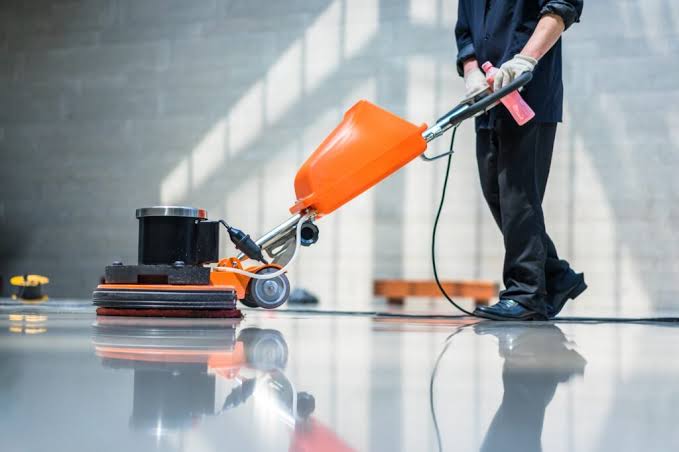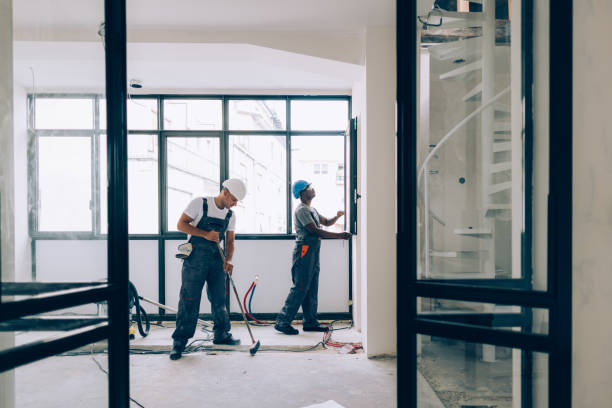
The Role of Facility Management in Employee Productivity
October 23, 2024
The Benefits of Hiring a Professional Cleaning Service
October 25, 2024Facility maintenance is an essential aspect of managing any industrial environment. Whether it’s a manufacturing plant, warehouse, or any other type of industrial facility, regular cleaning is vital to ensure the smooth operation of daily activities. This article delves into why regular industrial cleaning is crucial for facility maintenance, exploring the benefits, methods, and best practices to keep your facility in top condition.
Why Industrial Cleaning Matters
Industrial environments are often bustling with activity, which can lead to significant wear and tear over time. Regular industrial cleaning is crucial for several reasons:
- Health and Safety: A clean environment reduces the risk of accidents and health hazards. Dust, debris, and chemical residues can pose significant risks to employees, leading to respiratory problems, skin conditions, or even more severe health issues.
- Equipment Longevity: Industrial machinery is a significant investment. Regular cleaning ensures that equipment remains in good working condition, reducing the likelihood of breakdowns and extending its lifespan.
- Compliance with Regulations: Many industries are subject to stringent cleanliness and safety standards. Regular cleaning helps ensure compliance with local, state, and federal regulations, avoiding potential fines or legal issues.
- Enhanced Productivity: A clean working environment boosts employee morale and productivity. Workers are more efficient and motivated in a tidy, well-maintained facility.
Key Areas to Focus On
Effective industrial cleaning requires a comprehensive approach. Here are some critical areas to focus on:
1. Floor Cleaning
Industrial floors can accumulate a lot of dirt, grease, and debris. Regular sweeping and mopping are essential, but more intensive cleaning methods like scrubbing and pressure washing might be necessary for heavily soiled areas.
2. Machinery and Equipment
Machinery should be cleaned regularly to prevent the buildup of dust, grease, and other contaminants. This not only ensures smooth operation but also helps in early detection of wear and tear, allowing for timely maintenance.
3. Air Vents and Ducts
Air quality is a crucial aspect of a safe working environment. Regular cleaning of air vents and ducts helps remove dust and other pollutants, improving indoor air quality and reducing the risk of respiratory issues.
4. Storage Areas
Storage areas can often be overlooked, but they too require regular cleaning. This includes shelving units, bins, and any other storage solutions to prevent the buildup of dust and debris.
5. Restrooms and Break Rooms
Common areas such as restrooms and break rooms need to be kept clean to prevent the spread of germs and maintain a hygienic environment for employees.
Best Practices for Industrial Cleaning
Adhering to best practices ensures that industrial cleaning is both effective and efficient. Here are some guidelines to follow:
1. Develop a Cleaning Schedule
A well-structured cleaning schedule ensures that all areas of the facility receive regular attention. This schedule should outline daily, weekly, and monthly cleaning tasks, as well as more intensive periodic cleanings.
2. Use the Right Cleaning Products
Choosing the right cleaning products is crucial for effective industrial cleaning. This includes selecting products that are suitable for the specific materials and surfaces in your facility, as well as ensuring they are safe for use.
3. Train Your Staff
Proper training is essential for effective cleaning. Staff should be trained on the correct use of cleaning equipment and products, as well as safety procedures to avoid accidents and injuries.
4. Implement Safety Measures
Safety should always be a priority during industrial cleaning. This includes using appropriate personal protective equipment (PPE), ensuring proper ventilation, and adhering to safety guidelines and regulations.
5. Regular Inspections
Regular inspections help identify areas that need extra attention and ensure that cleaning standards are maintained. These inspections can be conducted by in-house staff or external auditors.
The Role of Technology in Industrial Cleaning
Technology is playing an increasingly important role in industrial cleaning. Here are some ways technology can enhance cleaning practices:
1. Automated Cleaning Machines
Automated cleaning machines, such as robotic scrubbers and vacuums, can significantly reduce the time and effort required for cleaning large areas. These machines can be programmed to clean specific areas at scheduled times, ensuring consistent cleaning.
2. Advanced Cleaning Agents
Innovative cleaning agents are being developed to tackle specific industrial cleaning challenges. These products are often more effective and environmentally friendly, reducing the impact on both the facility and the environment.
3. Real-Time Monitoring
Real-time monitoring systems can track the cleanliness of different areas in the facility, providing data on when and where cleaning is needed. This ensures that cleaning efforts are targeted and efficient.
Case Study: Success through Regular Cleaning
To illustrate the benefits of regular industrial cleaning, let’s look at a real-world example:
ABC Manufacturing Plant
ABC Manufacturing Plant, a large-scale producer of automotive parts, implemented a rigorous cleaning schedule across its facility. This included daily cleaning of floors and workstations, weekly deep cleans of machinery, and monthly inspections of air ducts and vents.
The Results
- Reduced Downtime: The plant experienced a significant reduction in equipment downtime, leading to higher productivity and reduced maintenance costs.
- Improved Employee Morale: Employees reported higher job satisfaction and productivity, attributing this to the cleaner and safer working environment.
- Regulatory Compliance: The plant consistently met all regulatory cleanliness standards, avoiding fines and enhancing its reputation in the industry.
Environmental Considerations
Sustainable practices are becoming increasingly important in all areas of industry, including cleaning. Here are some ways to make industrial cleaning more environmentally friendly:
1. Use Green Cleaning Products
Opt for cleaning products that are biodegradable and free from harsh chemicals. These products are less harmful to the environment and safer for employees.
2. Reduce Water Usage
Implementing water-saving techniques, such as using high-efficiency pressure washers, can significantly reduce water consumption during cleaning processes.
3. Proper Waste Disposal
Ensure that waste from cleaning processes is disposed of correctly, following local regulations. This includes proper disposal of hazardous materials and recycling where possible.
4. Energy-Efficient Equipment
Use energy-efficient cleaning equipment to reduce the overall energy consumption of your cleaning operations.
Conclusion
Regular industrial cleaning is a cornerstone of effective facility maintenance. It ensures a safe and healthy environment for employees, prolongs the lifespan of equipment, and helps maintain regulatory compliance. By following best practices and leveraging modern technology, facility managers can ensure their industrial spaces remain clean, efficient, and environmentally friendly.
Investing in regular industrial cleaning is not just about maintaining appearances; it’s about creating a foundation for operational excellence and long-term success. Whether it’s through a well-structured cleaning schedule, the use of advanced cleaning technologies, or the implementation of sustainable practices, the benefits of regular industrial cleaning are clear and far-reaching.



